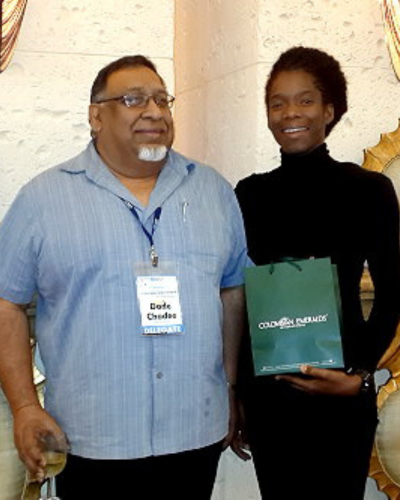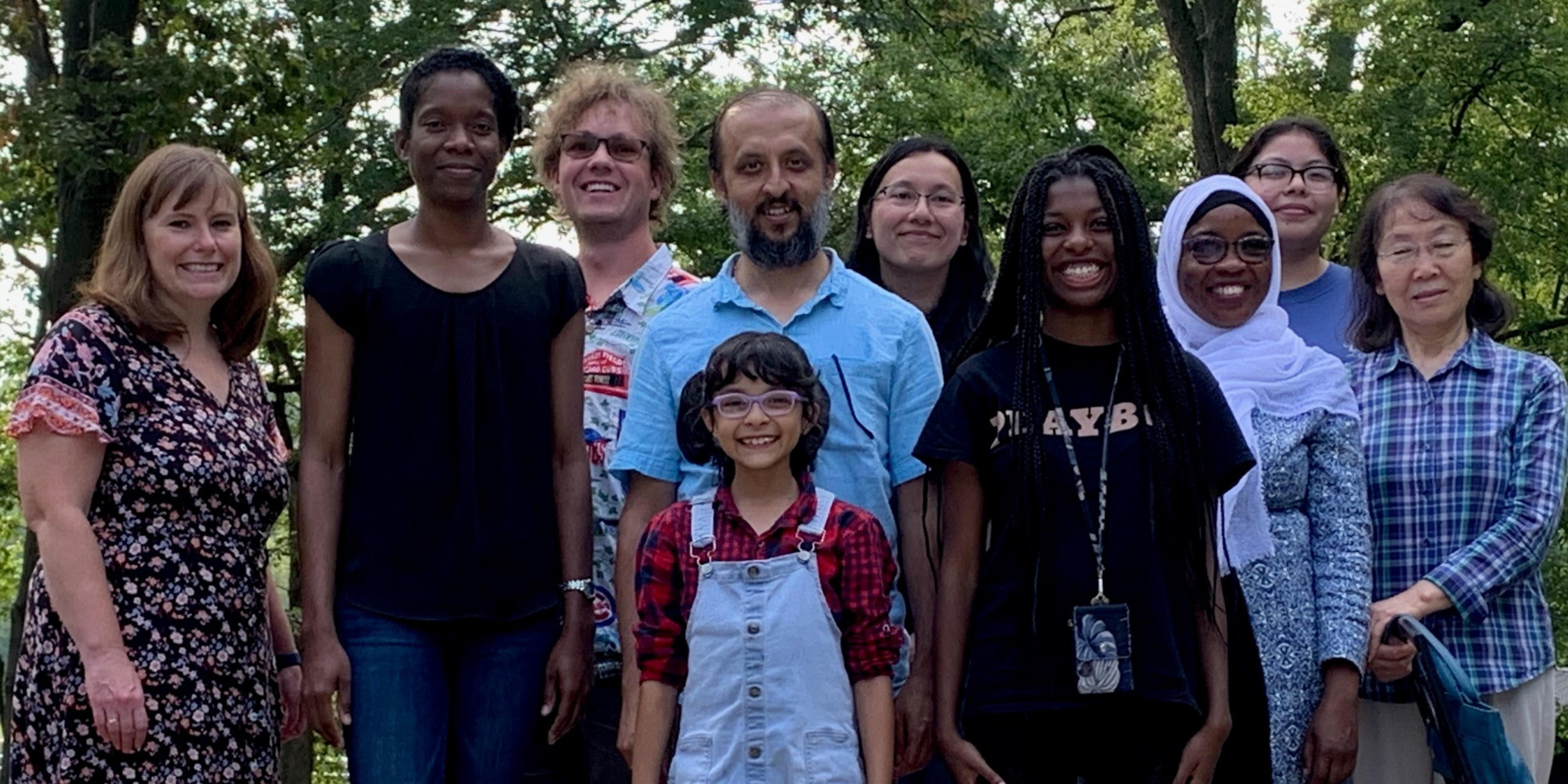International scholars tackle hidden humanitarian crisis
Not all heroes wear capes the saying made popular during the pandemic goes. This is especially true for the life-saving work of entomology that often goes under the radar of humanitarian causes. Mosquitoes kill an estimated one million people annually, making them a threat to nations throughout the tropics, and especially the Caribbean, Africa, and parts of Asia. This makes research scientists like the late-great Professor Dave Chadee, affectionately known as Mosquito Man for his groundbreaking research, real-life superheroes for tackling this humanitarian crisis. In that spirit, scholars from all over the world have partnered with IU and IUPUI to address this global health emergency.
One such scholar is Dr. Keshava Mysore, Assistant Research Professor in the lab of Dr. Molly Duman Scheel, the Navari Family Professor in the Department of Medical and Molecular Genetics at the IU School of Medicine - South Bend. Speaking about how he got involved in Mosquito research, Dr. Mysore explains:
“My graduate work was on ants. I was interested in ant neurology and how did ants become ants. I transitioned to mosquitoes during my first post doc in Basel, Switzerland. Working alone I was able to ask innovative questions. However, when I was able to collaborate with others doing mosquito research at the University of Notre Dame and IUSM-South Bend, I was able to join a larger community to conduct research in mosquito genetics and to apply this in novel ways for mosquito larval and adult population control.”
Only a small percent of the 3500 known mosquito species actually carries malaria and other blood-borne illnesses. What makes these tiny carriers so invasive is their tenacity, the late Dr. Chadee relayed that there is a species of mosquito whose proboscis can penetrate denim! Combine this with vulnerable environments where mosquitos and humans interact according to climate, season, and generally inadequate housing that does not offer much in way of protection from mosquito-human contact, and you have our current crisis. Climate change is exacerbating the situation, the flooded conditions left behind by hurricanes and other tropical storms represent ideal breeding grounds for mosquitos. These are the sociopolitical obstacles that our scholars are hoping to address.
Dr. Duman Scheel’s lab at IU School of Medicine - South Bend has become a nexus for research scientists interested in medical entomology (study of insects). Dr. Scheel explains that she saw the international collaborative model she uses and emulates from a colleague at UC-Irvine.
“They brought in people from around the world and then they returned to their countries. They know the culture and the networks and can use that background with their scientific experiences to make real scientific advancements. My international trainees inspire me.”
These translational research scholars plan to apply the insights gained to pressing insect-borne pathologies from around the world. Dr. Duman Scheel’s lab uses an integrated holistic approach to mosquito control. The lab is modifying yeast to include environmentally safe RNA-based pesticides. It enables them to target specific mosquito species while preserving the biodiversity of the environment. This fits well with Mosquito Man’s legacy of finding alternatives to the harmful side effects of traditional insecticides.
Dr. Duman Scheel and colleague, Dr. David Severson, Professor Emeritus, Notre Dame, fondly recall working in the field with Dr. Chadee in the Caribbean. This collaboration was also where international scholar, Akilah Stewart, first began research on their local projects. Dr. Stewart completed her Ph.D. in environmental biology at the University of West Indies where she was also mentored by the Mosquito Man. Dr. Stewart’s hope is to bring her research into microbial diversity in water sources and yeast cultivation to the lab’s collaborative research for further field work and lab-based inquiry.
field with Dr. Chadee in the Caribbean. This collaboration was also where international scholar, Akilah Stewart, first began research on their local projects. Dr. Stewart completed her Ph.D. in environmental biology at the University of West Indies where she was also mentored by the Mosquito Man. Dr. Stewart’s hope is to bring her research into microbial diversity in water sources and yeast cultivation to the lab’s collaborative research for further field work and lab-based inquiry.
These steps forward excite Dr. Longhua Sun, an international scholar from China. Dr. Sun originally worked with Dr. Duman Scheel’s father, Dr. John Duman, at the University of Notre Dame and is now a research technician in Dr. Scheel’s lab. She affirms that it excites her to see that the work they do here has a possibility of influencing the world.
Dr. Majidah Hamid-Adiamoh, a scholar from Nigeria, is similarly motivated. Dr. Hamid-Adiamoh saw a postdoctoral opening for the Scheel lab posted on Twitter and decided to apply. Working on her Ph.D. in Ghana, she studied molecular biology of infectious pathogens and has combined that with the genetic component of resistance to insecticides for vector control. She saw a gap in the need to develop novel tools for vector control and now in Molly’s lab, she is building skills in the technology to achieve this. Dr. Hamid-Adiamoh echoed the earlier sentiments of Dr. Duman Scheel :
“Working in this laboratory gives me the confidence that we can work [together] to eradicate malaria.”
Finally, there is Dr. Teresia Njoroge who came from Kenya to pursue a Ph.D. in Entomology at the University of Illinois. Her research is centered around mosquito ecology and control. Her interest in translational research led her to also applying for a postdoc position in the Duman Scheel lab. She also hopes to use mosquito genetics and molecular biology to develop environmentally safe insecticides for mosquito control. She is involved in making the yeast-based insecticides and testing their potential to kill mosquitoes in the lab. She recently travelled to Tanzania to help with setting up semi-field trials using the yeast-based insecticides for mosquito control and hopes to apply these insights to her home country of Kenya. This is a huge step forward in mosquito research. Working on insect-borne disease can become a life passion when it is fueled by scientific innovations and by researchers organically connected to the people most affected. The tremendous work of Dr. Duman Scheel and Dr. Severson is inspiring a new generation of international scholars who will better the world one scientific breakthrough at a time.
Photos:
(Top) Molly Duman Scheel, Akilah Stewart, Britton Sofhauser, Keshava Mysore and daughter Avan Mysore, Joi Misenti, Morgan Blakey, Majidah Hamid-Adiamoh, Diana Cervera, and Longhua Sun.
(Bottom) the late Dave "Mosquito Man" Chadee and Akilah Stewart.


